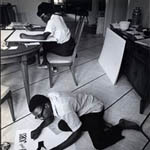By Laura J. Thomson, Director of Processing, Amistad Research Center
It is a new era of access for the Amistad Research Center thanks to the Center’s recent implementation of innovative archival collection management software. Archon, a collection management system for archives and manuscripts collections developed at the University of Illinois at Urbana-Champaign, has assisted in revealing the richness of Amistad’s holdings, has sparked staff to take on additional preservation projects, and has enhanced public relations in a variety of ways.
Archon is an open-source software program that provides full-text searching of finding aids using a web-based platform to facilitate global access to archives and manuscript collections. This is the first time in the history of the Amistad Research Center that access to collections, beyond digital images, has taken an online form. The results of implementation, which began in April 2009, have been highly successful. So far, the database has been populated with over 25 finding aids and over 150 legacy accession records about Amistad’s collections.
The staff, along with student interns and volunteers, is working diligently to populate the database with finding aids, previously available only in paper form. Guides to collections currently online, which are some of Amistad’s core research collections, include the records of the American Missionary Association and the American Home Missionary Society, the papers of Harlem Renaissance artist Richmond Barthé and poet/playwright Countée Cullen, the papers of physician Rivers Frederick, the papers of historian Gwendolyn Midlo Hall, the papers of civil rights activists Fannie Lou Hamer and John Lee Tilley, and the papers of New Orleans Mayors Ernest “Dutch” and Marc Morial. In addition to the guides to collections, the database includes organizational and biographical histories, and digital images from the collections.
Notes taken by Reverend John Lee Tilley during a Southern Christian Leadership Conference meeting October 31, 1958. From the John Lee Tilley Papers, Amistad Research Center at Tulane University.
The project has evolved since inception and given staff the opportunity to revisit collections processed during Amistad’s early years, conduct follow up research and much needed preservation, and expanded arrangement and description of its collections. Staff is often finding that the collection descriptions within our older paper finding aids are insufficient, and are now taking the opportunity to use the database to full advantage by expanding and often correcting legacy descriptive content. In addition to expanded description, the full-text search capability of the database is providing access to little known parts of the collections. Examples of what has been “rediscovered” so far include a portrait of Countée Cullen’s friend and financial supporter Sophie Victor Greene by the photographer Man Ray, a 19th century Vai (West African language) manuscript in the American Missionary Association records, the manuscript for an unpublished book of poems by Frank S. Horne entitled “Songs for a Lynching Bee,” and photographs of James Weldon Johnson and concert singer Roland Hayes, ca. 1920s, found in the Heslip-Ruffin Family papers.
The project has augmented Amistad’s ability to communicate with donors, increased requests for collaborations with other institutions, and formalized a new mentoring program for student interns and volunteers. Amistad has increasingly received positive feedback from researchers and donors due to the development of its online presence. The database assists staff working with donors to show the results of collections work that can be expected when they donate a collection. With the adoption of this award winning technology, Amistad is opening up its collections for research online and providing the opportunity to people to have access to the collections regardless of location. The link to the Amistad’s online database can be found through our website or directly at www.amistadresearchcenter.org/archon.
 “Working for Freedom: Documenting Civil Rights Organizations” is a collaborative project between Emory University, the Auburn Avenue Research Library on African American Culture and History, the Amistad Research Center at Tulane University and the Robert W. Woodruff Library at Atlanta University Center to uncover and make available previously hidden collections documenting the Civil Rights Movement in Atlanta and New Orleans. The project is funded by the Council on Library and Information Resources.
“Working for Freedom: Documenting Civil Rights Organizations” is a collaborative project between Emory University, the Auburn Avenue Research Library on African American Culture and History, the Amistad Research Center at Tulane University and the Robert W. Woodruff Library at Atlanta University Center to uncover and make available previously hidden collections documenting the Civil Rights Movement in Atlanta and New Orleans. The project is funded by the Council on Library and Information Resources.
